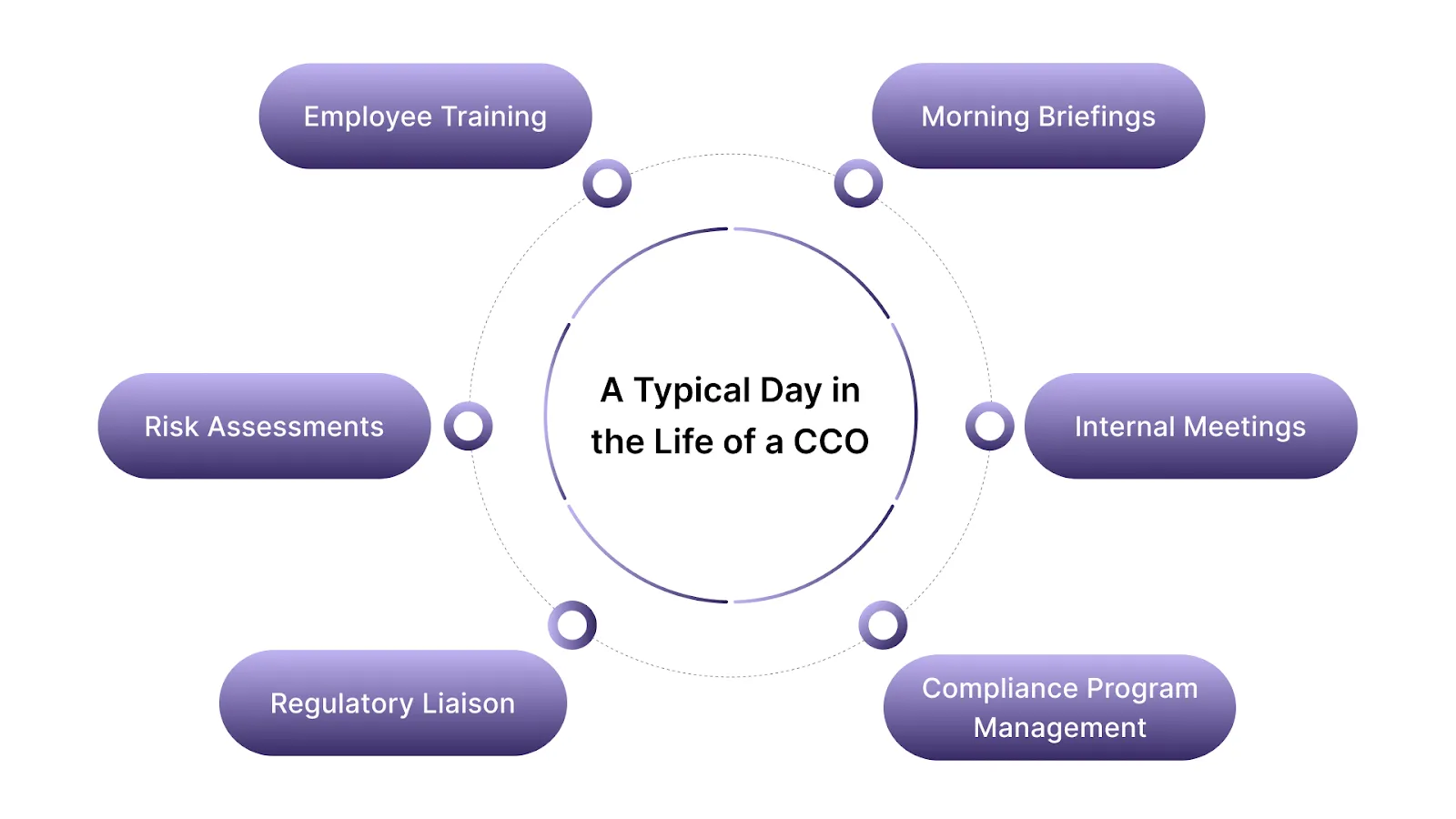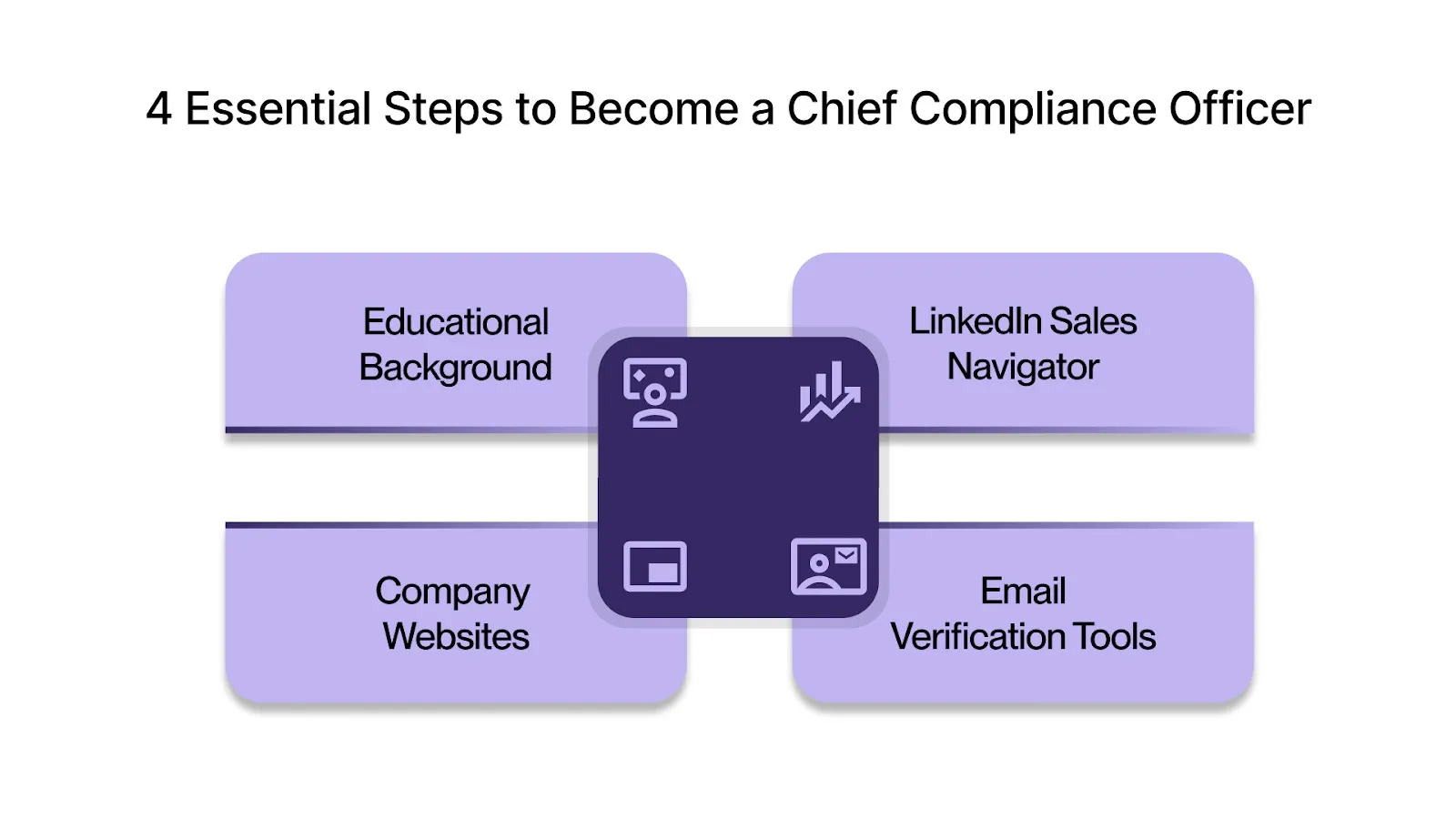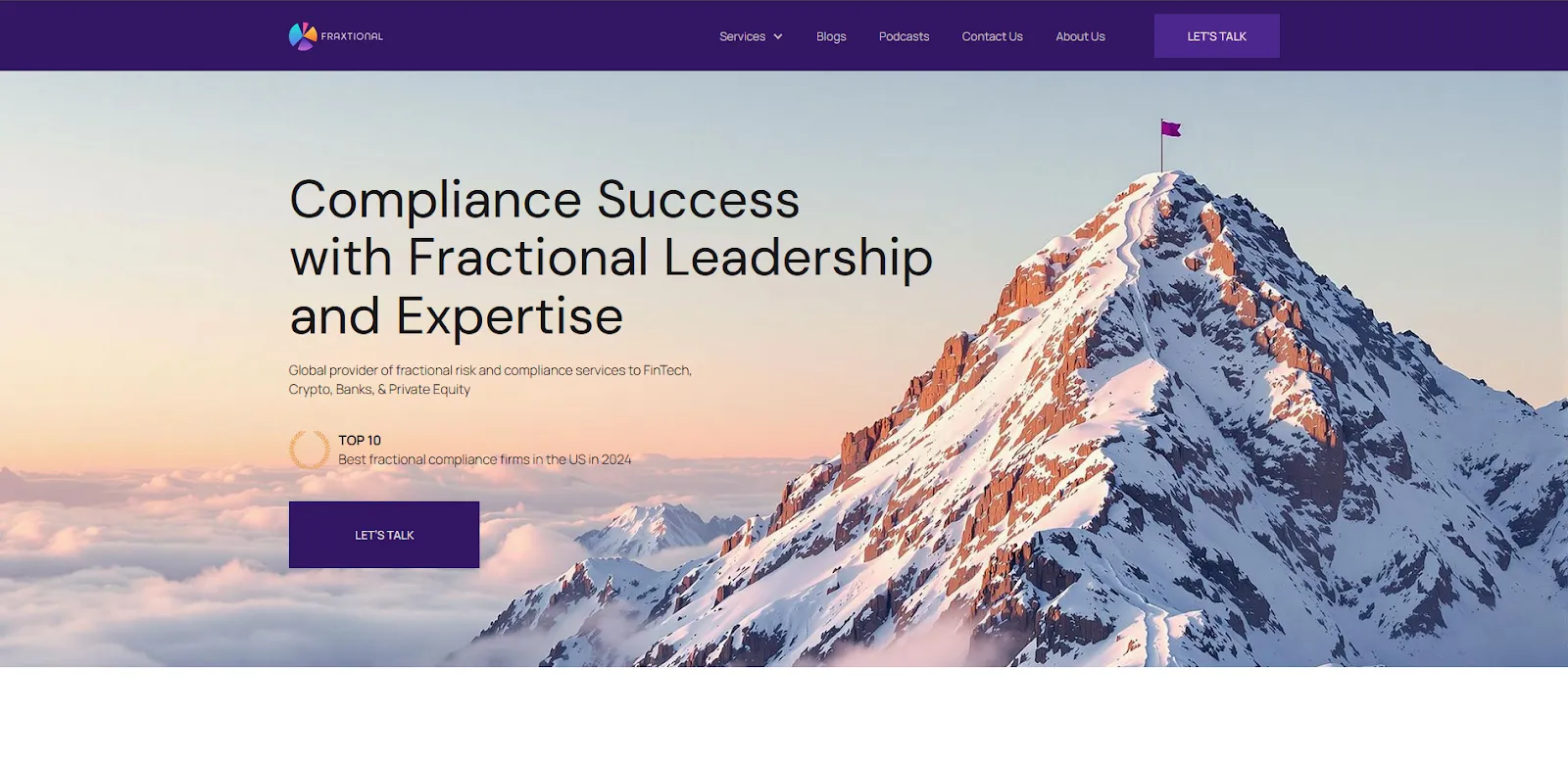May 16, 2025
Chief Compliance Officer: Key Responsibilities, Challenges & Business Impact

By Fraxtional LLC

The Chief Compliance Officer (CCO) plays a pivotal role in ensuring that an organization adheres to all relevant laws, regulations, and internal policies. In industries ranging from banking to healthcare to technology, the CCO is responsible for safeguarding the organization’s legal and ethical standing.
Gartner explicitly notes that data is the “key currency for CCOs in 2025,” calling out third-party risk monitoring, regulatory intelligence, and data-driven compliance risk detection as core priorities for Chief Compliance Officers. At leading organizations like Pfizer and JPMorgan, CCOs oversee risk and regulatory integrity across complex operations.
To better understand the full scope and strategic value of the Chief Compliance Officer, this blog will explore their responsibilities, challenges, and the impact they have on an organization's long-term sustainability.
Overview
- Key Responsibilities: CCOs develop and enforce compliance programs, manage risks, and ensure legal and ethical adherence across organizations.
- Strategic Value: The CCO is crucial for mitigating risks, protecting the organization’s reputation, and guiding business strategy on regulatory matters.
- Pathway to Becoming a CCO: The role requires a blend of education, experience, and certifications in compliance, law, or finance.
- Challenges Faced by CCOs: CCOs navigate complex regulations, resource limitations, and internal resistance while managing compliance crises.
- How Fraxtional Helps: Fraxtional offers flexible, on-demand CCO services to support businesses with expert compliance leadership and risk management.
Who is a Chief Compliance Officer?

A Chief Compliance Officer, or CCO, is a senior executive responsible for ensuring that an organization adheres to legal standards, regulatory requirements, and internal policies. They oversee the development and implementation of compliance programs, conduct risk assessments, and monitor internal controls.
The CCO plays a critical role in protecting the company from legal and financial penalties, as well as maintaining its reputation by building a culture of transparency and ethical business practices. Often reporting directly to the CEO or board of directors, the CCO provides strategic advice on regulatory matters and ensures that the organization is compliant with all applicable laws across different jurisdictions.
Common Misconceptions About the Life of a CCO
The role of a Chief Compliance Officer is often surrounded by misconceptions, with many viewing it as a desk-bound, paperwork-heavy job. In reality, CCOs are central to managing risk, shaping the company’s compliance culture, and ensuring ethical business practices. They are proactive leaders who work to keep organizations out of legal trouble and protect their reputation.
Here are some common misconceptions about the life of a CCO:
- CCOs Are Just Paper Pushers: While paperwork and regulatory reports are part of the job, CCOs also engage in strategic planning and risk management, guiding the organization’s approach to compliance.
- CCOs Only Deal with Legal Issues: The role extends beyond legal compliance. CCOs shape the company’s culture, ensuring that compliance is part of every decision and advising leadership on the broader business strategy.
- CCOs Have Limited Influence: Far from being sidelined, CCOs are often key advisors to senior leadership, providing critical insights on regulatory changes and helping drive the company's long-term strategic direction.
- CCOs Are Reactive, Not Proactive: Many think CCOs only act when something goes wrong, but they are proactive, identifying and mitigating risks before they escalate, and implementing systems that prevent future issues.
- The Role is Isolated: CCOs work closely with other departments, including legal, finance, and operations, to ensure that compliance is embedded in all aspects of the business.
A Typical Day in the Life of a CCO: Roles and Responsibilities

The role of a Chief Compliance Officer is dynamic and demanding, often requiring a balance between immediate compliance issues and long-term strategic planning. A typical day for a CCO may include:
- Morning Briefings: Reviewing the latest regulatory updates and compliance issues, assessing risks, and deciding on the next steps for ongoing investigations or audits.
- Internal Meetings: Meeting with senior leadership and departments to align on compliance strategies and address any potential operational issues.
- Compliance Program Management: Overseeing and updating the company’s compliance programs to ensure they meet regulatory standards and are effectively implemented.
- Employee Training: Coordinating and conducting training sessions to ensure that employees understand and adhere to compliance policies.
- Risk Assessments: Continuously evaluating compliance risks and adjusting policies to stay ahead of emerging threats.
- Regulatory Liaison: Communicating with regulators, industry groups, and external auditors to ensure that the organization meets all external requirements and reporting standards.
Striking Work-Life Balance as a CCO
Given the strategic and often reactive nature of the CCO role, maintaining a work-life balance can be challenging. However, successful CCOs manage their time and responsibilities effectively by:
- Delegating Tasks: CCOs delegate routine compliance tasks to their teams, allowing them to focus on higher-level strategy and risk management.
- Prioritizing Well-being: Managing stress through structured time management and setting boundaries to ensure work does not overflow into personal time.
- Flexible Work Arrangements: Fractional CCOs, such as those offered by Fraxtional, can work on a part-time or on-demand basis, allowing them to maintain a healthier balance between their professional and personal lives.
By delegating effectively and incorporating flexible working arrangements, CCOs can successfully navigate the demands of their role while maintaining a sustainable work-life balance.
Industry Insight: Growing Complexity in Compliance
The regulatory landscape has become increasingly complex in 2025. According to a recent survey, 85% of respondents reported that compliance requirements have become more complex in the last three years. This underscores the growing challenges faced by CCOs in managing compliance across various jurisdictions and industries.
To address these challenges, many CCOs are investing in technology and data analytics. For instance, seven out of ten CCOs surveyed expect their technology budgets to increase, with 56% anticipating a 5% to 10% hike. This investment is expected to focus on data analytics, cybersecurity, data privacy, and process automation.
These trends highlight the evolving role of CCOs in not only ensuring compliance but also in incorporating technology to enhance compliance programs and manage risks more effectively.
4 Essential Steps to Become a Chief Compliance Officer

Becoming a Chief Compliance Officer involves a blend of education, experience, and the development of key professional skills. Here’s a general pathway:
Step 1. Educational Background
A bachelor's degree in law, business, finance, or a related field is the first step. Many CCOs also pursue advanced degrees or certifications in compliance and risk management, such as the Certified Compliance & Ethics Professional (CCEP) or the Certified Anti-Money Laundering Specialist (CAMS).
Step 2. Professional Experience
Gaining experience in compliance roles, like compliance officer, risk manager, or legal advisor, is essential. This experience provides a deeper understanding of the regulatory landscape and the practical application of compliance policies.
Step 3. Skills Development
CCOs need to develop strong leadership skills, analytical thinking, and in-depth knowledge of legal frameworks. Skills in risk assessment, problem-solving, and internal auditing are highly beneficial.
Step 4. Certifications and Continuous Learning
Professional certifications are often required or preferred by many organizations. Continuous education and staying up-to-date with new regulations, policies, and industry standards are key to advancing in this role.
For those who may need support or guidance in navigating complex compliance challenges, companies like Fraxtional offer fractional CCO services, providing experienced compliance leadership without the long-term commitment.
Evolving Tools and Trends in Compliance

To keep up with regulatory complexity and business innovation, modern CCOs are embracing tools and strategies that go beyond traditional compliance frameworks:
- Analytics & AI: Predictive analytics and AI help identify compliance risks before they materialize, offering data-driven decision-making across departments.
- Regulatory Intelligence: Automated platforms track global regulatory changes in real-time, helping CCOs adapt policies faster.
- Third-Party Risk Management: As businesses increasingly rely on vendors and external partners, managing compliance across supply chains is critical.
- ESG Oversight: ESG regulations are becoming enforceable. CCOs now play a role in ensuring accurate disclosures and ethical governance practices.
Top 5 Challenges Faced by a CCO

The role of a Chief Compliance Officer comes with significant challenges that require a mix of strategic thinking and strong management skills. Here are some of the most common hurdles:
- Regulatory Complexity: Navigating an increasingly complex and constantly changing regulatory landscape is one of the top challenges for CCOs. Laws vary across jurisdictions, and staying compliant requires constant monitoring and adaptation.
- Resource Limitations: Many organizations struggle with limited resources for compliance programs. CCOs must balance the need for robust compliance systems with budget constraints, often needing to prioritize where and how resources are allocated.
- Internal Resistance: CCOs often face resistance from employees or departments that view compliance as an obstacle to productivity. Building a culture of compliance that is seen as a business enabler rather than a hindrance is key to overcoming this challenge.
- Crisis Management: Dealing with compliance breaches, whether they’re accidental or intentional, is part of the role. A CCO must act swiftly and efficiently to mitigate damage and prevent further violations.
- Keeping Pace with Emerging Risk Areas: CCOs are now expected to understand and oversee compliance in new domains like ESG mandates, third-party partnerships, and digital privacy laws. Navigating these areas requires not only regulatory awareness but also the ability to interpret insights from compliance analytics and AI-driven tools, which can predict risks before they escalate.
- Keeping Up with Technology: As organizations adopt new technologies, especially in sectors like fintech and healthcare, CCOs must ensure that digital tools comply with privacy and security regulations, like GDPR or HIPAA.
Read: Understanding Regulatory Risk and Compliance Management
Should You Hire a Chief Compliance Officer?

Determining whether to hire a CCO depends on several factors, including your firm's size, regulatory complexity, and growth trajectory. Commonwealth outlines three primary options for fulfilling this role:
- Hiring a Full-Time CCO: Ideal for larger firms with complex regulatory needs. This option provides dedicated oversight but comes with significant costs.
- Outsourcing Compliance Functions: Suitable for firms seeking expertise without the overhead of a full-time hire. Outsourcing offers flexibility and access to specialized knowledge. Fraxtional offers on-demand, fractional CCO services, making this option highly effective for businesses that need expert compliance leadership without the commitment of a full-time hire.
- Affiliating with a Broker/Dealer or RIA: For firms transitioning to independence, partnering with a broker/dealer or Registered Investment Adviser (RIA) can provide compliance support, allowing you to focus on client relationships and business development.
Each option has its pros and cons, and the best choice depends on your firm's specific circumstances and strategic goals. Fraxtional can help guide businesses through these decisions, offering personalised fractional compliance services that meet your evolving needs.
Here’s How Fraxtional Can Support Your Compliance Strategy

Fraxtional offers businesses an invaluable solution by providing fractional Chief Compliance Officer services, ideal for startups and organizations that may not have the resources for a full-time, in-house CCO. By partnering with Fraxtional, businesses gain access to experienced compliance leadership, customized strategies, and expert guidance on navigating complex regulatory requirements.
Fraxtional assists organizations by:
- Providing Expertise: Their team of seasoned compliance professionals helps design and implement effective compliance programs across industries such as fintech, banking, and healthcare.
- Stay Ahead of Trends: Fraxtional's experts stay ahead of evolving compliance trends by incorporating AI-driven risk detection, regulatory intelligence, and compliance analytics into their strategies. Whether you need help managing third-party risk or aligning your operations with ESG requirements, Fraxtional ensures your compliance program is forward-looking and resilient.`
- Mitigating Compliance Risks: Fraxtional proactively identifies potential risks and ensures that businesses are prepared for regulatory changes before they impact operations.
- Offering Scalable Solutions: Whether a company needs temporary compliance leadership during a transitional period or ongoing support, Fraxtional offers flexible, scalable solutions that align with the company’s needs.
- Cost-Effective Leadership: For organizations that cannot justify the cost of a full-time CCO, Fraxtional provides expert compliance leadership at a fraction of the cost.
- Managing Complex Compliance Issues: Whether it's navigating the complexities of GDPR in the EU or regulatory requirements in the U.S., Fraxtional ensures your organization stays compliant with all applicable laws, freeing up internal resources for growth.
Fraxtional allows companies to maintain robust compliance standards without the need for a permanent, full-time CCO, ensuring that the business is always aligned with industry regulations and ready for the challenges ahead.
Conclusion
A Chief Compliance Officer plays an important role in guiding an organization through the complexities of compliance, mitigating risks, and safeguarding its reputation. Their leadership ensures the business operates ethically, stays compliant, and adapts to regulatory changes.
For businesses looking for flexible and expert compliance leadership, Fraxtional provides strategic guidance, risk management, and regulatory support with a team of experienced compliance professionals to ensure your organization stays compliant without the need for a full-time hire.
Is your compliance strategy up to date? Let Fraxtional's expert CCOs guide your business through complex regulations and ensure your compliance program is future-ready. Get in touch today!
FAQs
A Chief Compliance Officer typically holds a degree in law, business, finance, or a related field. Advanced certifications in compliance, like CCEP (Certified Compliance & Ethics Professional) or CAMS (Certified Anti-Money Laundering Specialist), can be beneficial for career progression.
A CCO manages compliance risks by assessing the business’s operations, identifying potential areas of risk, and implementing policies and procedures to address them. As businesses grow, the CCO ensures that the company adapts to changing regulations without compromising operational efficiency.
Small businesses often find it challenging to hire a full-time CCO due to cost constraints. However, fractional services like those offered by Fraxtional can provide expert compliance leadership on a flexible basis, making it a cost-effective solution for smaller companies.
Fraxtional offers businesses on-demand, fractional Chief Compliance Officer services, providing personalized compliance strategies without the need for a full-time hire. Their team of experts helps manage risks, ensures regulatory adherence, and develops compliance programs suited to the specific needs of the business.
While compliance is essential across all industries, sectors like finance, healthcare, and technology particularly benefit from having a dedicated CCO to navigate complex regulations. Fraxtional supports businesses in these industries with expert compliance leadership, helping them stay ahead of evolving regulatory requirements.
A fractional CCO, such as those provided by Fraxtional, can guide a business through periods of regulatory change by ensuring the company’s policies and practices are updated to comply with new regulations. They offer flexibility and expertise without the cost of a full-time CCO.
blogs
Don’t miss these
Let’s Get Started
Ready to Strengthen Your Compliance Program?
Take the next step towards expert compliance solutions. Connect with us today.




